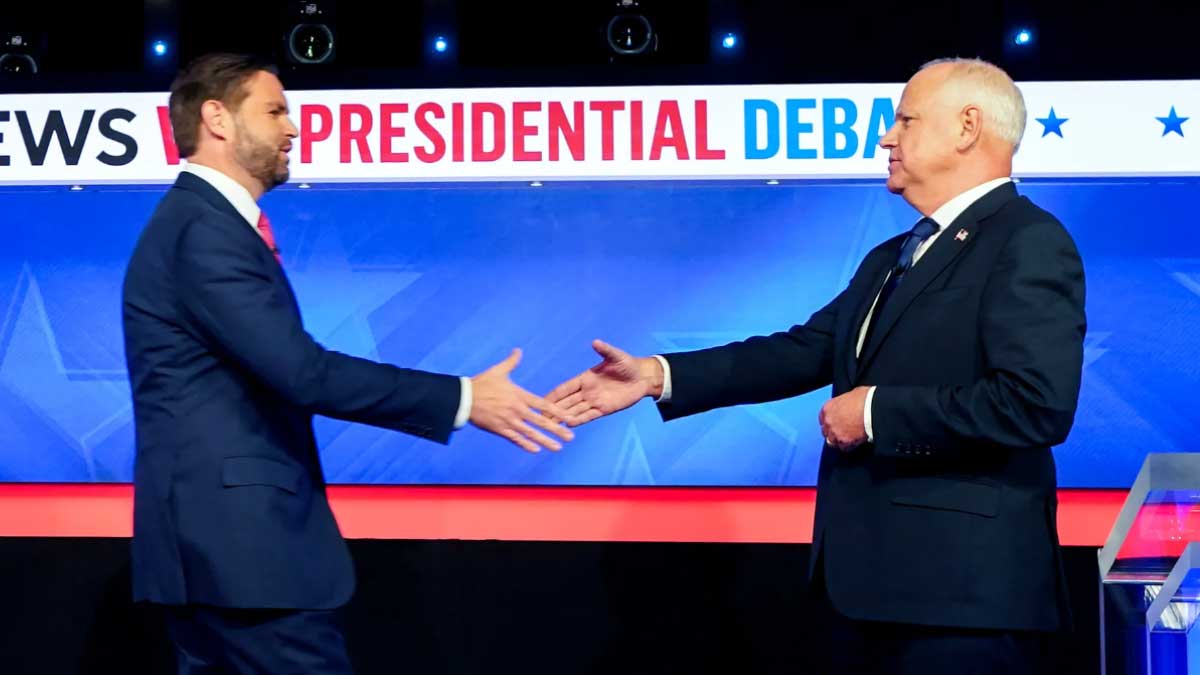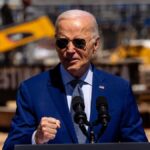- Home
- Billionaires
- Investing Newsletters
- 193CC 1000
- Article Layout 2
- Article Layout 3
- Article Layout 4
- Article Layout 5
- Article Layout 6
- Article Layout 7
- Article Layout 8
- Article Layout 9
- Article Layout 10
- Article Layout 11
- Article Layout 12
- Article Layout 13
- Article Layout 14
- Article Sidebar
- Post Format
- pages
- Archive Layouts
- Post Gallery
- Post Video Background
- Post Review
- Sponsored Post
- Leadership
- Business
- Money
- Small Business
- Innovation
- Shop
Recent Posts
43 Million Watch Vance-Walz Vice Presidential Debate

More than 43 million viewers across the United States watched what is likely to be the only vice presidential debate of the election cycle, featuring Ohio Senator JD Vance and Minnesota Governor Tim Walz. While the audience was significant, it represented a notable decline in viewership compared to previous debates, particularly the one in 2020 between then-Vice President Mike Pence and Senator Kamala Harris. Preliminary data from Nielsen indicated that the debate attracted approximately 43.15 million viewers across 15 different networks. CBS, which hosted the event, recorded the highest average viewership at about 9.1 million, followed by Fox News with 7.7 million and ABC with 6.1 million. These early ratings indicate a 25% drop in audience size compared to the 2020 vice presidential debate and a staggering 36% decrease from the 67.1 million who tuned in to watch the presidential candidates debate earlier in September.
In 2020, the Harris and Pence debate drew an estimated 51 million viewers at its outset, with subsequent data revealing an adjusted figure of approximately 57.9 million. The current numbers highlight a shifting landscape in political engagement, as fewer viewers appear to be tuning in for vice presidential discussions this election cycle. Despite the decline in viewership, early polling conducted by CBS following the debate suggests that both candidates saw an increase in their favorability ratings. An impressive 88% of viewers surveyed felt that the debate was generally positive in tone. The event was characterized as civil and largely focused on policy issues, covering a range of topics including the economy, the January 6 Capitol riot, health care, abortion rights, and immigration.
The debate featured a spirited exchange, particularly when the candidates discussed immigration policies. Tensions flared when Vance, after being fact-checked by the moderators, went off on a tangent regarding the asylum application process online. This prompted a brief disruption, during which microphones were cut off, signaling the moderators’ effort to maintain order amidst the heated discussion. Polling immediately following the debate did not yield a clear winner; according to a CBS and YouGov poll, 42% of respondents believed Vance emerged victorious, while 41% thought Walz had the edge. The remaining 17% of those surveyed felt that the debate ended in a tie. This indicates that while both candidates effectively communicated their viewpoints, neither was able to decisively outperform the other in the eyes of the viewers.
Throughout the debate, Vance and Walz explored a variety of critical issues facing voters today. They addressed the state of the economy, an area of particular concern as inflation and job security remain at the forefront of many Americans’ minds. The candidates also discussed the aftermath of the January 6 insurrection, which continues to influence political discourse, particularly regarding democracy and electoral integrity. Health care was another major topic, with both candidates offering differing perspectives on how to improve access and affordability for citizens. The discussion on the southern border and immigration policies highlighted the ongoing debates within the country, particularly as communities continue to grapple with the challenges posed by migration and asylum-seeking. Abortion rights also took center stage, reflecting the heightened focus on reproductive health issues following the recent Supreme Court decisions. Both candidates articulated their stances, which resonated with viewers, particularly younger voters concerned about personal liberties and healthcare rights.
The debate has sparked various reactions from the political landscape, including notable commentary from former President Donald Trump. Shortly after the debate concluded, Trump took to social media to suggest that the Harris campaign had requested another debate, implying that Walz had performed poorly. Trump stated that he would not engage in a rematch against Harris, asserting that he was leading significantly in the polls, with votes already cast. As of Wednesday afternoon, Harris was leading Trump by a narrow margin in national polling averages, with RealClearPolitics reporting a 2.2 point lead, while FiveThirtyEight indicated a slightly larger margin of 2.8 points. These figures illustrate the competitive nature of the current electoral environment, with candidates vying for voter attention and support.
The vice presidential debate between JD Vance and Tim Walz served as a crucial platform for both candidates to present their positions on key issues. While the viewership numbers reflected a decline from previous elections, the substantive discussions and the resulting polling indicate that voters remain engaged in the electoral process. As the political landscape continues to evolve, both candidates will need to capitalize on this momentum and further connect with constituents to ensure their success in the upcoming election. The debate also highlights the ongoing relevance of vice presidential candidates in shaping voter perceptions and influencing the broader political narrative as the election cycle unfolds.
Recent Posts
Categories
- 193 Countries Consortium Partner1
- 193cc Digital Assets2
- 5G1
- Aerospace & Defense48
- AI37
- Arts3
- Banking & Insurance11
- Big Data3
- Billionaires1,506
- Boats & Planes1
- Business332
- Careers13
- Cars & Bikes79
- CEO Network1
- CFO Network17
- CHRO Network1
- CIO Network1
- Cloud10
- CMO Network18
- Commercial Real Estate7
- Consultant1
- Consumer Tech194
- CxO1
- Cybersecurity73
- Dining1
- Diversity, Equity & Inclusion4
- Education7
- Energy8
- Enterprise Tech29
- Events11
- Fintech1
- Food & Drink2
- Franchises1
- Freelance1
- Future Of Work2
- Games149
- GIG1
- Healthcare79
- Hollywood & Entertainment203
- Houses1
- India’s 1000 Richest1
- Innovation46
- Investing2
- Investing Newsletters4
- Leadership65
- Lifestyle11
- Manufacturing1
- Markets20
- Media327
- Mobile phone1
- Money13
- Personal Finance2
- Policy569
- Real Estate1
- Research6
- Retail1
- Retirement1
- Small Business1
- SportsMoney42
- Style & Beauty1
- Success Income1
- Taxes2
- Travel10
- Uncategorized15
- Vices1
- Watches & Jewelry2
- world's billionaires1,475
- Worlds Richest Self-Made Women2
Related Articles
South Korea Plane Crash: A Tragic Loss and Global Mourning
The tragic plane crash at South Korea’s Muan International Airport on Sunday...
By 193cc Agency CouncilDecember 30, 2024H-1B Visa Debate Splits Trump Allies and Silicon Valley
The debate over H-1B visas has once again become a contentious issue,...
By 193cc Agency CouncilDecember 28, 2024Trump Moves $4B Stake in Truth Social Parent, Stock Drops 6%
Donald Trump recently transferred his 57% stake in Trump Media & Technology...
By 193cc Agency CouncilDecember 20, 2024House Rejects Trump-Backed Funding Bill, Shutdown Looms
The U.S. House of Representatives rejected a new government funding bill on...
By 193cc Agency CouncilDecember 20, 2024















Leave a comment